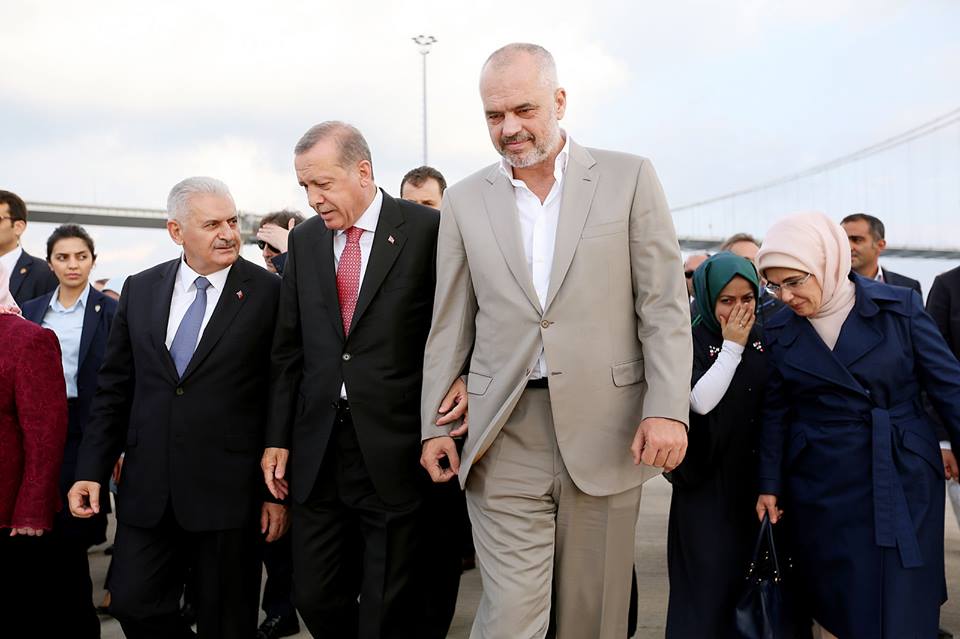
In an interview yesterday with journalist Ilva Tare, Prime Minister Edi Rama explained his relations with Turkey, especially now that the EU is anxiously looking at the influence of the autocratic regimes on its eastern borders on the Balkans. This influence of Turkey and Russia is no doubt a major component of its considerations concerning its enlargement in this region.
One of the points of concern is the growing financial and religious influence of Turkey on Albania. For example, the new central Namazgja Mosque built in Tirana is financed by Turkey and constructed by a Turkish company. In response, Prime Minister Rama said the following:
The relations with Turkey do not pose any threat. […] If the Catholics and Orthodox received their own cathedrals, the Muslims deserve to have their own equally valuable temple, neither larger nor small, and I think that is the right thing. As regards the financing, […] the financing has been given by the Turkish Muslim community to the Albanian Muslim community. And the latter does not depend on the government, and it’s enough that the financing doesn’t come from terrorist sources.
The whole point is of course not that the Albanian Muslim community does not depend on the government, but that the Turkish Muslim community does. In Turkey, religion is under tight control of the government, which therefore means that the money for the Namazgja Mosque is by all means and purposes an investment of the Turkish state, which is under full control of President Recep Tayyip Erdoğan.
And the financing of the Namazgja Mosque is not the only way in which Turkey has “helped” Albania.
In 2016, the tender for the new uniforms of the State Police under the direction of then Minister of Interior Affairs Saimir Tahiri was “saved” by Erdoğan, who was publicly thanked by Rama for his “support,” even though it remain unclear what type of support the Turkish government had given to the production of the uniforms.
More recently, the Turkish state has been openly involved in Rama’s project to start up an Albanian Airlines, which he has announced for the summer. Again, President Erdoğan was personally thanked by Rama. At the same time, an “unrequested offer” arrived for the construction of Vlora Airport by a conglomerate of Turkish companies close to the Turkish government.
The Turkish government has also been exerting, so far with limited success, pressure on the Albanian government in closing down schools run by the Gülen movement, a religious organization that Turkey is alone in considering a terrorist group. So far, this has only led to the unconstitutional move by the Ministry of Education of prohibiting Gülen schools from showing Turkish flags and other symbols, but the recent illegal extradition of 6 Gülen teachers from Kosovo to Turkey shows the extent to which Erdoğan has been extending his influence in the region.
A more recent example are the attacks against leader of the Albanian Muslim Community, Skënder Bruçaj, by Turkish media, claiming he is a Gülenist. Several media have recently reported that President Erdoğan has demanded his dismissal by Prime Minister Rama as condition for a visit to the inauguration of the Namazgja mosque.
Furthermore, the Turkish government is increasing its grip on educational institutions in Albania through the Maarif Foundation, a government-linked organization which has taken over all the educational activities of Gülen schools after the the Gülen organization was declared a terrorist group. In Albania, the opening of Maarif schools goes hand in hand with the Turkish government’s demand to close educational institutions allegedly under control of the Gülen movement, while several sources have confirmed to Exit that the Maarif Foundation is in the process of acquiring several major private universities in Albania, including the University of New York in Tirana, Luarasi University, and the Canadian Institute of Technology.
The influence of Erdoğan’s governments thus stretches from the police to large infrastructural projects and education. At the same time, the relations between Rama and Erdoğan are more than cordial; Rama was an official witness at the wedding of Erdoğan’s daughter. At the same time, Rama has refused to condemn the violence and human rights violations by the Turkish government, failing to follow the criticism of other European countries. In fact, the leadership of Erdoğan is a clear inspiration for Rama’s own authoritarian tendencies.
Although he may continue to deny this in public, Prime Minister is hedging his bets on EU accession negotiations. He knows that no matter what may happen on the European front, Turkey may turn out to be a much more trustworthy investor in the country, and without the unpractical demands for human rights and the rule of law.

